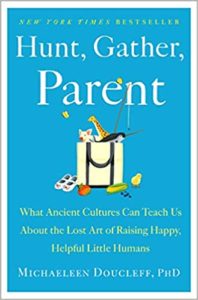Book Review: Hunt, Gather, Parent
Michaeleen Doucleff, the author of Hunt, Gather, Parent: What Ancient Cultures Can Teach Us About the Lost Art of Raising Happy, Helpful Little Humans, was looking for guidance on raising her strong-willed, rambunctious 3-year-old. As any good investigative journalist would do, she began to research the “options.” And the most effective ideas and parenting guidance she discovered came from sources flung to the far ends of the world. With daughter in tow, she visited a variety of indigenous peoples—a Mayan village in Mexico, Inuit families in the Arctic Circle, and Hadzabe families in Tanzania—to gain some very useful parenting advice. And I loved it. Some of the reviews I read were critical of various aspects of this book. For instance, they accused her of a gender bias, espousing parenting techniques of indigenous peoples as though they have no counterparts in Western parenting guidance (in fact, they are similar to Montessori or RIE parenting), and “framing tribal parents as eternally happy, and Western parents…as miserable victims of circumstances.”
I don’t know about all that…but I do know our society gets so caught up in finding fault and criticizing where a work (in our opinion) falls short , where we think it won’t work, or simply what’s wrong with it…rather than looking at the good gifts the work offers for many situations and people. And Hunt, Gather, Parent offers many excellent gifts. It offers wonderful advice to parents about effective ways of raising their children, advice that both fathers and mothers can apply.
This advice is founded, in part, on a parent’s perspective of children. Are children simply miniature adults that we can expect to behave appropriately? Or are they children who need to learn how to behave, manage emotions, and do tasks we call chores? Hadzabe parents offered Ms. Doucleff an excellent answer. In addition to this, Michaeleen Doucleff learned practical ways to remain calm when her child engages in tantrum behavior, how to encourage cooperation rather than control, and how to meet personalized needs rather than expect developmental milestones. She also talks with a variety of experts along the way to learn more about what she was witnessing and putting into practice.
All in all, this book is filled with gifts for every parent—great ideas and practical takeaways every parent will find helpful, all wrapped in a warm storytelling style. Use what you can, and you will not only find your children’s behavior improving, but your relationship with your children improving as well. And isn’t that what we all want?

-0 Comment-